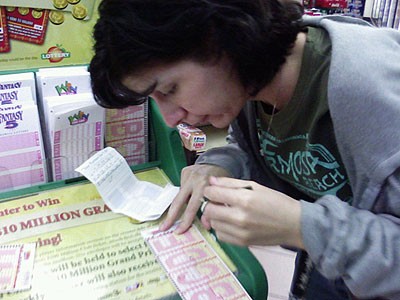There was a fascinating article in the New York Times the other day about the limits people will push in order to get by in tough times.
No, I’m not talking about the fascinating county-by-county analysis of government benefits received per capita, thought that Times article too is an amazing feat of journalism and one well worth localizing – there are plenty of business angles in there as well as political ones. But you don’t need me to point that out.
The article that caught my eye was “Not betting a dime, a voucher vulture cleans up at the slots.” It’s the story of Gary Bemsel, who for the past 15 years or so has eked out a living of sorts by lurking around casinos and racetracks, hoping to swoop up a few cents here and there of unclaimed winnings left behind by careless gamblers. (For those wondering how that is possible, think of it as the equivalent of accidentally dropping a winning lottery ticket in the liquor-store parking lot: These days, slot machines are largely coinless and sometimes players leave their machines forgetting to press the button that will cash out unused credits on a bar-coded, dollar-bill sized slip of paper. At racetracks, non-winning betting slips traditionally are flung to the floor, and sometimes in the bustle, winning slips fall there too. Those who comb them for profit are known as ‘stoopers’ and apparently they are a common figure at tracks.)
Bemsel is generating as much as $1,200 a week with the gambling-hall equivalent of picking up roadside cans and bottles to return for deposit, and it got me to thinking about the many interesting ways people are getting what they want these days despite a stagnant jobs market and, for many, stalled cash flow. It’s a great premise for a personal finance or small-business story.
For example, this CNN Money article, “Apps that let you share everything, including yourself” highlights grass-roots ideas from car-sharing to house-sharing that allow individuals to share resources for fun and/or profit. One such notion is Cloo (for community loo); it aims to connect users willing to let one another use their private bathrooms in time of need; while apparently not up and running yet it has an active Twitter feed. And as one watcher Tweeted, sounds like a must-have for Mardi Gras — which brings to mind Couchsurfing.com, a similar community that aims to help users find affordable accommodations. (Thanks to Reynolds Center Digital Director Robin Phillips for the tip to the CNN Money story.)
TaskRabbit is interesting, as far as I can glean, people who need services from carrying boxes to the basement to bathtub re-caulking advertise their need, and ‘rabbits’ respond auctioning themselves by price. The software will pick the lowest bidder, or the hirers can opt to browse the offers themselves and select a hiree. And kudos to CNN Money for pointing out the caveats and downsides to all of these person-to-person exchanges — like getting your house robbed by renters — as well as the benefits; insurance and liability angles are musts if you localize this sort of personal finance story.
I’ve written before about ‘time banks’ — both ways that individuals and small businesses get the goods and services they need without exchanging cash. You can Google for local networks; check also with CPAs whose clients might need help with accounting for these transactions; technically barter income is reportable and sometimes taxable, according to the Internal Revenue Service.
Another neat concept is co-ops. From parent-to-parent babysitting pools to produce buying to neighborhood garden tool exchanges, pooling resources to afford big-ticket goods or services is a really interesting personal finance (or small business) angle. Here’s an organization, Bench, that aims to provide metal-working and wood-working space and tools to professionals and what it calls ‘weekend warriors,’ thanks again to Robin Phillips for the tip.










